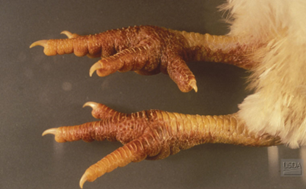
Dandenong Fancy Pigeon Society
1975 - 2025 Celebrating 50 Years
of Dedication to the Fancy

Announcements -June 2024
|
To keep fanciers informed: Avian Influenza - Bird Flu ANPA National Show in Melbourne - Geelong Cancelled.
Update: 12 July 2024. Bird flu advice from Animal Care Australia (ACA) President, PDF document here. Please note that the link to the Victorian Agricultural site does not work in the PDF document, that can be found here.
Update: 26 June 2024. This is just a summary of information that I have been researching on the topic of Avian Influenza or Bird flu, which is currently in Victoria and NSW. We have been through these issues before as fanciers, and all I can recommend is to keep abreast of issues on Avian Influenza and be vigilant with your birds and their care. It's deadly to chickens, but not to pigeons, as per this article published in Purebred Pigeon in 2015 (H5N2), and specifically mentions that Pigeons are not a vector for that variant of the virus, and that they can't spread it. But goes on to mention that mammals like dogs, cats, mice/rats, cows, waterfowl and other migratory birds can be carriers that can spread the virus. Dr Colin Walker has confirmed that these new variants are not a vector in pigeons for the avian virus on the ANPA site here. Is there a test for Avian Influenza that can be performed on pigeons/chickens or a vaccine that can be used rather than culling birds? (May be Dr Colin Walker can shed some light on this one)?
As a result of the Avian Virus and the inconsistent rules or behaviour from separate State Depts. of Agriculture the ANPA National Show in Melbourne (Geelong) has been cancelled. It is hoped the ANPA National show can be held at the same venue in 2025.
Does avian influenza affect people? In Australia there is a very low risk of people becoming infected with avian influenza viruses through normal contact with healthy birds. People should avoid direct contact with birds or mammals that are sick or have died unexpectedly and use good hygiene measures for handling and disposing of dead birds or mammals.
Is avian influenza a food safety risk? NSW Food Authority advice is that avian influenza (bird flu) does not pose a food safety risk for consumers. Eggs and poultry meat are safe to eat provided they are handled and cooked according to safe food handling practices.
What does avian influenza look like? Signs of avian influenza (AI) infection in domestic poultry and birds can be variable from no obvious signs to sudden death. Affected birds can display any of the following signs:
Figure 1a – Bird with a swollen head, combs and wattles, noting the darkened combs and wattles.
Figure 1b - Swollen and darkened legs and feet. Image credit: Dr D Swayne, USDA, Iowa State University Department of Veterinary Pathology, Center for Food Security and Public Health (CFSPH), Armed Forces Institute of Pathology (AFIP), and Plum Island Animal Disease Center (PIADC).
Here is an article from The Age – Examine section that I received recently as an email. It again points to back yard poultry and coops as a possible vector to undoing their efforts to contain the current avian virus. Here is a link to Dr. Matt Mason’s web page on this. He also believes that we need access to better vaccines rather than relying on costly culling of birds.
The best site for current information for Victoria is: https://agriculture.vic.gov.au/biosecurity/animal-diseases/poultry-diseases/avian-influenza-bird-flu
https://www.outbreak.gov.au/current-outbreaks/avian-influenza They mention H7, but not the variant on all of the outbreaks and they call it high pathogenicity. They do have a good write up on "Biosecurity practices on your property". If you own backyard poultry or other birds, these simple steps will help protect them from these diseases:
Link to Domestic Poultry definition: https://en.wikipedia.org/wiki/Poultry#Definition
They locked all fanciers in Victoria down, other states locked their borders to Victoria (the irony in that is that free or wild birds don’t know or care about borders, and the virus flew over the borders), and many infected birds died or were destroyed in the effort to eradicate it. In the end they could not control the spread and just gave up (they also ran out of funds). They really could not effectively pin down the areas of infection or control the outbreak. A PMV vaccine was made available to fanciers and racing clubs. Actions recommended for PMV in 2012:
ANPA Show measures taken for PMV in 2012 (Can we use the same measures for Avian Influenza): Implement strategies to ensure ideals in bio-security are enforced within our exhibition protocol, along this regulation base: 1/ All exhibits will be certified as having been vaccinated annually and within the specified time prior to exhibition. 2/ Exhibits will not make contact with feral, introduced or native species, in transit or in exhibition. 3/ No bird other than those certified, as above, will be admitted to the exhibition pavilion. 4/ Exhibits will be certified to have been kept and exhibited under these regulations throughout the exhibition season. 5/ All bio-security protocol as specified by the DPIs will be strictly adhered to and enforced.
So if other States are worried about this Avian virus any interstate birds travelling over state borders may be quarantined or even culled by the worried interstate DPIs or Depts. of Agriculture, even if the risk is low or even nil for pigeons. Because it's not a Federal co-ordinated effort, and there are no consistent rules or behaviour from separate State Depts. of Agriculture, this leaves fanciers vulnerable in terms of consistent rules between states.
|
| Latest Events | ||
|
||



